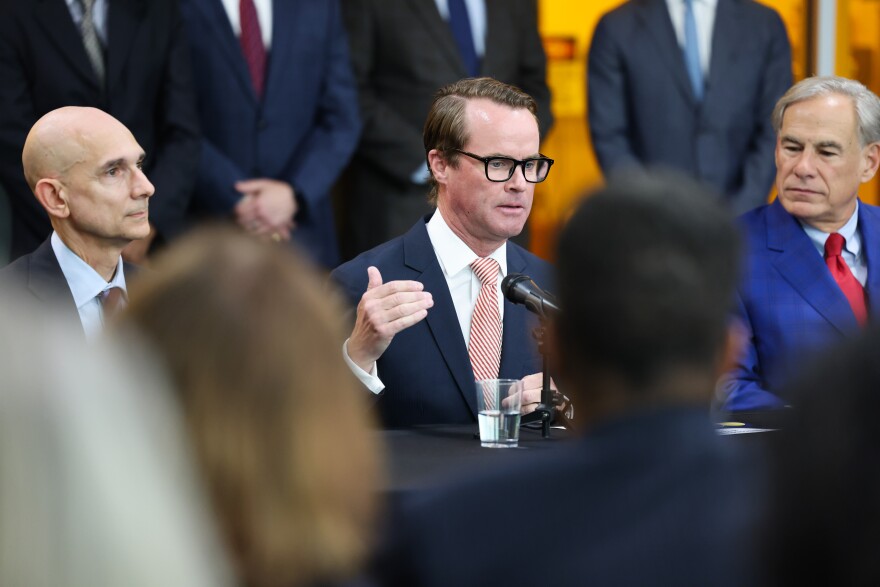Texas leaders have appointed an executive board of experts in science and technology that will help oversee the state's semiconductor industry.
Gov. Greg Abbott announced Tuesday the nine first-ever members of the new Texas Semiconductor Innovation Consortium executive committee, a board of experts mandated under the Texas CHIPS Act, which Abbott signed into law last year.
The governor’s office described the consortium as an advisory panel — overseen by the new executive committee — that will plan semiconductor manufacturing, research, education and investment across the state.
Semiconductors or microchips are the small but essential foundations of a variety of electronic devices. Texas is already home to Texas Instruments, a global semiconductor manufacturer, and offices for companies like Samsung and Tesla.
“Our future already is filled with microchips, and we are just getting going in that process,” Abbott said. “They are already in your cars, your watches, your refrigerators, medical devices. Basically, everywhere you turn, you are engaged with something that has a microchip in it. That is just going to accelerate in the coming years.”
State leaders announced the committee’s creation at the University of Texas at Dallas. The consortium’s members include Texas House Speaker Dade Phelan and State Rep. Greg Bonnen, R-Friendswood, who both joined the governor at UTD Tuesday.

Like other industries, chip manufacturers took a hit when the COVID-19 pandemic led to supply chain disruptions resulting in a semiconductor shortage. That trend began to reverse in recent years as supply chains ramped back up and manufacturers scrambled to meet the increased demand.
Analysts project the semiconductor industry could reach a market size of more than $1 trillion over the next decade.
Abbott, Phelan and Lt. Gov. Dan Patrick appointed seven members of the committee, according to a news release.
Abbott selected UTD President Emeritus David Daniel Jr., who the board appointed as chair; Sameer Pendharkar of Allen, senior fellow and vice president of technology development at Texas Instruments; and Lawrence “Larry” Smith of Austin, board chair of Tokyo Electron U.S., a Japanese semiconductor company with an office in Austin.
Patrick appointed Guy A. Schweppe of Austin, the senior vice president of technology and software procurement at Dell Technologies, and Jeffrey M. Smith of Cedar Park, the vice president of Infra Technology at Samsung Austin Semiconductor.
Phelan appointed Eric Almgren of Austin, managing director at technology consulting company Castle Peak Advisors, and David (Jong Ho) Lee, director of corporate strategy at Dongjin USA, Inc., which is part of a chemical company that specializes in producing semiconductor, display and energy materials.
The other board members are chancellors from the Texas A&M and UT systems or their designees, as required by the Texas CHIPS Act: Joe Elabd, vice chancellor for research at the Texas A&M University System, and S.V. Sreenivasan, the Cockrell Family Regents Endowed Chair No. 7 in Engineering at UT Austin.
Terms of board members appointed by Abbott, Patrick and Phelan expire at the three's discretion, according to the news release. Sixteen other individuals will represent universities across the state in the consortium.

The semiconductor industry is globally competitive and complex, Daniel said, not just because of the advanced materials, research, design and nanoscale measurements involved, but also because of supply and logistics needs.
“We know that Texas has the people to succeed today because we are succeeding,” Daniel said. “But as these industries grow in Texas, we're going to need thousands — maybe tens of thousands of additional Texans contributing to the success of the semiconductor research and manufacturing enterprise.”
The Texas CHIPS Act also created a fund that will use money from the federal CHIPS and Science Act passed in 2022 to accomplish the consortium’s goals. Bonnen said funding will include private dollars, too.
The next step is to appoint an executive director who will oversee day-to-day responsibilities and the individuals who carry them out.
The creation of the executive committee provides an opportunity to identify larger issues with regulatory barriers, workforce needs and infrastructure shortcomings that stand in the way of semiconductor progress, Bonnen said.
“The whole idea here is that, yes, we lead the nation, but are we doing the best that we can?” he said. “And the answer is, 'we can do better.'”
Got a tip? Email Toluwani Osibamowo at tosibamowo@kera.org. You can follow Toluwani on X @tosibamowo.
KERA News is made possible through the generosity of our members. If you find this reporting valuable, consider making a tax-deductible gift today. Thank you.
Copyright 2024 KERA. To see more, visit KERA. ![]()

